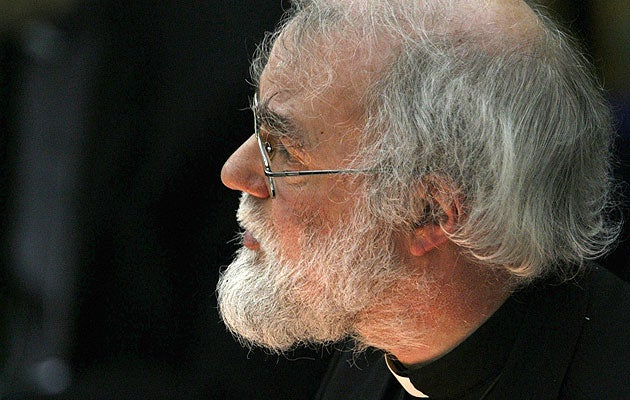Church risks split as Synod votes to ordain women bishops

Your support helps us to tell the story
From reproductive rights to climate change to Big Tech, The Independent is on the ground when the story is developing. Whether it's investigating the financials of Elon Musk's pro-Trump PAC or producing our latest documentary, 'The A Word', which shines a light on the American women fighting for reproductive rights, we know how important it is to parse out the facts from the messaging.
At such a critical moment in US history, we need reporters on the ground. Your donation allows us to keep sending journalists to speak to both sides of the story.
The Independent is trusted by Americans across the entire political spectrum. And unlike many other quality news outlets, we choose not to lock Americans out of our reporting and analysis with paywalls. We believe quality journalism should be available to everyone, paid for by those who can afford it.
Your support makes all the difference.The Church of England was thrown into disarray last night after its ruling body, the General Synod, rejected a series of amendments by traditionalists opposed to the ordination of women bishops. These included a proposal to create so-called "superbishops" that would have allowed clergy who object to the idea of female bishops to opt out of being administered by them.
A motion reaffirming the Church's commitment to press ahead with the consecration of women bishops was passed late last night after more than six hours of passionate and, at times, bitter debate. The bishops voted in favour of bringing forward legislation to ordain women bishops by 28 to 12. The clergy voted in favour by 124 to 44 and the Laity by 111 to 68.
Virtually all the amendments put forward by traditionalists, which could have provided them with a variety of opt-out clauses, were struck down one by one. Their defeat raises the real possibility of schism within the Church, between those in favour of women bishops and an alliance of traditionalists, Anglo-Catholics and evangelicals who vehemently oppose the idea.
Hundreds of traditionalist clergy have said they may walk out of the Anglican Communion if the Church goes ahead with the consecration of women bishops without providing legal safeguards to protect their beliefs. One bishop was even moved to tears as he berated the Synod for failing to reach a compromise that might have appealed to both camps and keep the increasingly fractured Communion unified.
The Bishop of Dover, Steven Venner, told delegates: "For the first time in my life I feel ashamed. We have talked for hours about wanting to give an honourable place for those who disagree. We have turned down almost every realistic opportunity for those opposed to flourish. And we still talk the talk of being inclusive and generous."
The rejection of the amendments came despite pleas from the Archbishops of Canterbury and York, who both appeared to come out in favour of creating a legal framework that would have allowed traditionalists to opt out of being administered by women bishops – either by joining a non-geographical diocese or being presided over by so-called "superbishops".
Traditionalists reacted angrily to the Synod's decision and accused liberal elements in the Church of using a "scorched earth policy" to force them out. Canon David Houlding, a senior Anglo-Catholic from London said: "It is getting worse. We are going downhill very badly."
One lay delegate even suggested some traditionalists may now consider breaking away from the Church of England to join more conservative or evangelical provinces abroad.
Gender campaigners argue that 15 Anglican provinces – including Canada, New Zealand, Cuba and Australia – have already begun consecrating women bishops and none of them have opted for any form of legal provisions that would create a "church within a church". They believe that super-bishops would create the type of two-tier system for male and females that would be nothing short of legalised discrimination.
Join our commenting forum
Join thought-provoking conversations, follow other Independent readers and see their replies
Comments